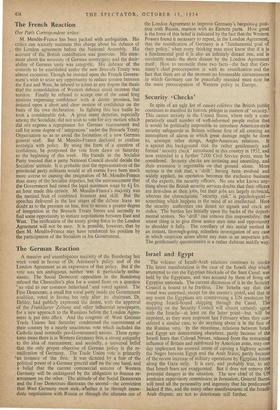Israel and Egypt
The volcano of Israeli-Arab relations continues to smoke The latest manifestation is the case of the Israeli ship which attempted to run the Egyptian blockade of the Suez Canal, was held by the Egyptians, and was accused by them of firing on Egyptian nationals. The current discussion of it in the Security Council is bound to be fruitless. The Israelis say that the vessel was unarmed, except for the master's pistol, and that in any event the Egyptians are contravening a UN resolution by stopping Israeli-bound shipping through the Canal. The majority on the Security Council will almost_ certainly agree with the Israelis—at least on the latter point—but will be impotent, as they were impotent last February when they con- sidered a similar case, to do anything about it in the face of the Russian veto. In the meantime, relations between Israel and Egypt are deteriorating elsewhere, partly because of the Israeli fears that Colonel Nasser, released from the restraining influence of Britain and reinforced by American arms, may one day implement his avowed intent of carving a highway across the Negev between Egypt and the Arab States; partly because of the recent increase of military operations by Egyptian forces along the Gaza strip. It is easy, and probably true, to say that Israeli fears are exaggerated. But it does not remove the potential dangers in ,the situation. The new chief of the UN armistice supervisory commission in Jerusalem, General Burns, will need all the personality and ingenuity that his predecessor lacked if this, and the many other manifestations of the Israeli. Arab dispute, are not to deteriorate still further.


































 Previous page
Previous page